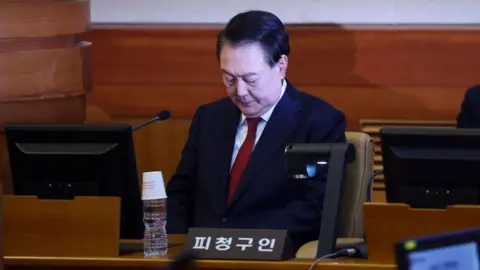South Korea president Yoon Suk Yeol denies ordering arrest of lawmakers at impeachment trial
 EPA
EPA
The Constitutional Court is deliberating whether Yoon should be permanently removed from office
South Korea’s suspended president Yoon Suk Yeol has made his first appearance at his impeachment trial, where he denied ordering the arrest of lawmakers during his attempt to impose martial law.
Parliament voted to impeach Yoon last month, and last week the constitutional court began a trial to decide whether to permanently remove him from office.
Yoon is also facing a separate criminal investigation into whether he led an insurrection. He has been detained since last week.
Security was tight on Tuesday as Yoon was transported by van from the detention centre, where he is being held, to the constitutional court.
Police formed human walls and held up anti-riot barricades to stop hundreds of his supporters who had gathered nearby from getting too close. Last weekend saw violence as dozens of Yoon’s supporters clashed with law enforcers and broke into another court house.
On Tuesday, Yoon was asked if he had ordered military commanders to “drag out” lawmakers from parliament on the night he declared martial law, in order to prevent them from overturning his order.
He replied: “No.”
Military commanders had earlier alleged that Yoon had given such an order on 3 December, after lawmakers climbed fences and broke barricades to enter the parliament building and vote down Yoon’s martial law declaration.
“I am a person who has lived with a firm belief in liberal democracy,” Yoon said in his opening remarks on Tuesday.
“As the constitutional court exists to safeguard the constitution, I ask that you thoroughly examine all aspects of this case,” he told the judges.
During the hearing, which lasted nearly two hours, Yoon and his lawyers argued that the martial law order was “a formality that was not meant to be executed”.
Yoon had cited threats from “anti-state forces” and North Korea when he declared martial law, but it soon became clear that his move had been spurred not by external threats but by his own domestic political troubles.
The lawyers prosecuting the case, who were selected by the parliament, accused Yoon and his lawyers for making “largely contradictory, irrational, and unclear” comments.
“If they continue to evade responsibility as they did today, it will only work against them in the impeachment trial and cause even greater disappointment among the public,” the prosecutors told reporters after the hearing.
Outside the courtroom, his supporters became more agitated and aggressive as they demanded that Yoon be released and restored to office immediately.
Those were forced to set up some distance from the court due to tight security. Waving their trademark combination of Korean and US flags, some wore Maga-style baseball caps embossed with the slogan “Make Korea Free Again”, an echo of the campaign slogan used by US President Donald Trump.
Some of their chants included calls for the leader of South Korea’s main opposition party, Lee Jae Myung, and the investigator leading Yoon’s criminal case to be executed.
Several of the supporters told the BBC they believed Yoon’s martial law declaration was an attempt to protect the country’s democracy.
They accused the opposition party of being pro-China and pro-North Korea, and for wanting to turn South Korea into a communist country.
“This is a conflict between people who pursue communism and people who pursue democracy,” said Wongeun Seong, a 49-year-old businessman who joined the protest on the way back from a lunch meeting.
Former defence minister Kim Yong-hyun, who reportedly suggested martial law to Yoon, will testify during the next hearing on Thursday.
Yoon will be removed from office if at least six of the eight-member constitutional court bench votes to uphold the impeachment. A presidential election must then be called within 60 days.
South Korea has been in political chaos since 3 December. Thousands of protesters and supporters of Yoon have taken to the streets multiple times despite the winter cold.
The crisis has hit the country’s economy, with the won weakening and global credit rating agencies warning of weakening consumer and business sentiment.
Additional reporting by Hosu Lee in Seoul
#South #Korea #president #Yoon #Suk #Yeol #denies #ordering #arrest #lawmakers #impeachment #trial
